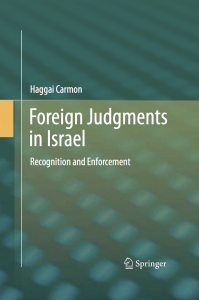by: Adv. Haggai Carmon
Gad Chemicals Ltd. (the appellant), BIP Chemicals Ltd. (the respondent), Iranian businessman Farrokh Mahboubian, and other parties, formed an enterprise in 1976 in Iran’s chemical manufacturing industry. Gad, BIP, and Mahboubian entered into a tri-party agreement which governed the financial issues related to the investment in the enterprise.
After the Islamic Revolution in Iran put an end to the enterprise operations, Mahboubian filed two claims which were heard by the International Court of Arbitration: the first against Gad and BIP for payment of the premium interest as defined in the tri-party agreement; the second against BIP alone for return of the premium that he had offered to Gad and BIP as part of the agreement. In the first claim, the arbitration award ordered Gad and BIP, jointly and severally, to pay USD 1.3 million to Mahboubian; the second arbitration award ordered BIP to pay Mahboubian the sum of USD 1,110,000, plus expenses and legal fees. BIP filed a claim at the Haifa District Court that Gad was liable for 67.63% of the total sums paid to Mahboubian under the two awards.
The parties reached a procedural agreement to submit the foreign arbitral decisions to arbitration proceedings in Israel. The agreement also stated that, should the Israeli arbitration award be vacated, the court could rule according to the evidence and briefs that were before the arbitrator.
The arbitrator decided that the foreign arbitration awards presented to him as evidence were “valid and binding” and that Gad must therefore compensate BIP for the sums paid to Mahboubian, as per the awards.
Gad filed a motion at the Haifa District Court to vacate the Israeli arbitration award. The court granted the motion, stating that, under Israeli law, the court holds exclusive jurisdiction to confirm an arbitration award – in this case the foreign arbitral decision. This remains true even though the parties’ procedural agreement attempted to grant jurisdiction to an arbitrator. At this point, litigation was resumed in the court.
The District Court accepted BIP’s claim, dismissing Gad’s arguments that the foreign arbitration awards may not be used as evidence. The court added as obiter dicta that, as support for BIP’s contribution claim, the foreign awards could even be accepted as evidence through indirect recognition of a foreign arbitral award.
The Foreign Judgment Recognition Law, 5718-1958 deals with foreign judgments, not arbitration awards, and therefore did not directly apply in the case at hand. However the court held that an approach similar to that of the Foreign Judgments Law could be applied to foreign arbitration awards, in that indirect recognition of a foreign arbitral award, does not require special proceedings. In the end, the Court held Gad liable for a total of USD 2,250,000 towards BIP, which constituted 67.63% of the premium and premium interest, and 50% of expenses and legal fees which had been awarded to Mahboubian in the foreign proceedings, and paid by BIP.
The primary question before the Supreme Court was whether BIP had proven that the debt it had paid to Mahboubian was indeed legitimate and due to him by law. The court first briefly surveyed the relevant provisions of the Arbitration Law, 5728-1968 and the Convention on the Recognition and Enforcement of Foreign Arbitral Awards citing my book – Foreign Judgments in Israel: Recognition and Enforcement regarding the grounds for objection that parties may raise.
BIP had not filed a motion to confirm the foreign arbitration awards under the Arbitration Law and for this reason, they could not be recognized for the purpose of their enforcement in Israel. The question at stake was whether that situation was sufficient to bar any use of the foreign awards as evidence in this complaint.
The Supreme Court noted the special circumstances of the case at hand in which proceedings for confirmation of the foreign arbitration award were not available to the plaintiff, as the defendant was not a party to the arbitration proceedings, nor was the plaintiff the prevailing party under the award. Thus, the court held that, as a rule in such cases, a plaintiff should be able to submit a foreign arbitration award as evidence in proceedings between him and the defendant and in this way support the cause of action. (The Court qualified that this would not be possible had the award been submitted for confirmation and confirmation denied due to public policy or failure to meet one of the relevant conditions set by Article 5 of the New York Convention.)
The Supreme Court held that a foreign judgment is inherently unlike a foreign arbitration award, as the dominant aspect there is the fact that it is an arbitration award, not that it is “foreign.” In the Supreme Court’s opinion, this was an integral difficulty in the first court’s attempted analogy from the Foreign Judgments Law.
Under these circumstances, the Court ruled that it did not find any well-founded argument that would bar submission of the arbitration awards as evidence in the complaint. The court added that this conclusion was especially true given that the awards were submitted as evidence in the Israeli arbitration proceedings and given the procedural arrangement between the parties which provided that, should the Israeli arbitration award be vacated, the court could decide the contribution claim according to the evidence and briefs before the arbitrator.
Thus, the Supreme Court ruled that BIP’s cause of action for contribution against Gad for the premium and premium interest that BIP paid Mahboubian was indeed proven by the foreign arbitration awards.








